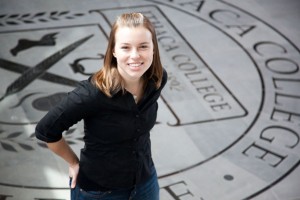Senior Agata Kubik, a native of Czestochowa, Poland, didn’t have aspirations to study in the United States until late in her high school career.
After making her first trip to the states during the summer after her junior year to be a camp counselor in the Poconos, she decided she really liked America. But what went along with coming to school here wasn’t easy.

“I didn’t know what I needed to do at all,” Kubik said. “I was like, ‘What? SATs? What is that exactly?’ And it was already September of my senior year, so by that time most American students almost have their applications ready, and I was only figuring out what the whole process is about.”
With her do-anything-you-set-your-mind-to attitude, Kubik whipped out the SATs, three SAT IIs and the Test of English as a Foreign Language in a matter of three months.
The culture and communication major has a passion for international relations. She spent time living in Germany when she was younger and speaks five languages — Polish, German, English, French and Russian.
With her broad range of interests, Kubik said the Division of Interdisciplinary and International Studies has been a great fit.
“This major, being an interdisciplinary major, was absolutely perfect because I got to develop knowledge in all of these other areas and combine it as well as methods of communication and different cultures and how they interact and so on,” she said.
Though being an international student has its limitations and difficulties, Kubik never lets that affect her. She takes everything in stride and has yet to be hit by senioritis.
Since she can’t work an off-campus job, she works four different jobs on campus in order to support herself. And on top of that, she has two internships and an 18-credit course load in her last semester. But no matter what she’s doing, she wears the same bright, wide-mouthed smile.
The laugh she emits from that smile is something most of her friends, and even strangers, recognize. Senior Kirsten Cornille, Kubik’s roommate and close friend, described it as a dolphin laugh but with a closed vowel instead of an open vowel.
Jean Celeste-Astorina, admissions counselor and co-chair of Class Hosting at Ithaca, said when she first met Kubik she was struck by her dedication and outgoing personality.
“When she’s faced with a challenge, it really brings out her best,” Celeste-Astorina said. “I was new to the program; she was learning along with me, and she seeks to learn, she seeks responsibility. She’s a natural-born problem solver.”
Senior Liana Garcia-Osborne, Kubik’s other roommate and best friend, said when she first met Kubik freshman year, she was the type of person who took on too much at once, but she has since developed into someone who knows what she can and can’t commit to.
Kubik’s organizational skills, something she said she really had to work on, have helped her manage a still-overwhelming schedule.
“Organization is not my strong suit, but I had to master it in order to be able to do everything I want to and still be able to afford rent,” she said.
But regardless of Kubik’s many commitments, Garcia-Osborne said Kubik puts everything aside for a friend in need.
“She kind of intuitively gets a sense of your emotional state maybe even when you don’t know,” she said. “She’ll oftentimes be like, ‘Are you OK? Did something happen?’”
Along with her already demanding schedule, Kubik has managed to start the small nonprofit Women’s Vocational Organizing for an Indelible Change in Ethiopia.
A year and a half from now, Kubik plans to move to Ethiopia to execute this program, where she hopes to teach women in rural areas different vocational skills so they can earn a steady income, become empowered and get nutritious food.
Kubik had a chance to attend a summit in Philadelphia recently where she was able to talk to women of the Ethiopian Diaspora. She said they helped give her great ideas that she hopes to use in her initiative.
“I don’t want to make the mistake that a lot of NGOs do that they go into a developing country and tell people what to do,” she said. “I want to empower them, so be able to hear their voices, have their input and learn from them just as much as they might learn from me and my experience.”







